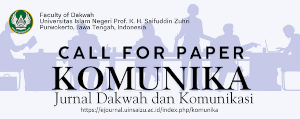MAKNA HIDUP DI BAUK TRADISI MUDIK LEBARAN (STUDI FENOMENOLOGI ATAS PENGALAMAN PEMUDIK DALAM MERAYAKAN IDUL FITRI DI KAMPUNG HALAMAN)
DOI:
https://doi.org/10.24090/komunika.v5i1.774Keywords:
Mudik Lebaran, Experience, Meaning, Therapeutic Fundion, Life of People who do Mudik-PemudikAbstract
Mudik lebaran(visiting hometown on Idul Fitri Days) is an annual tradition which is never left by most urban people who are originallyfrom smalleror othertown. Some days before Idul Fitri day, we can see how crowded the traffic is. It is a unique phenomenon of Idul Fitri which is especially found in Indonesia. Lebaran/ Idul fitri is a specific example about how Islamic idioms are creatively intrepreted in Indonesian culture. This unique and specific example of lebaran in Indonesia can be seen not only on the phenomenon of mudik but also on the situation and idioms such as takbiran, shaking hands, sungkeman, halal bi halal, ziarah kubur (visit cemetery) before lebaran and before the month of Ramadhan (nyadran), lebaran banquet, giving some moneytochildren, etc. Besidesthe explanation ofthe meaning of lebaran from normative sides, it is necessary to reveal the subjective meaning of lebaran tradition. This research revealed those meanings through phenomenological perspedive and analyzed them with psychoanalysis. Using the logotherapytheory of Viktor Frankl, it was found thatthe values ofthe tradition to go hometown during Idul Fitri days helped them to find the meaning of life. The values or meanings which could be found are: the meaning of family relatives and its education valueforthe family, existence meaning, primordial meaning, and transformative meaning. Those meanings indeed are very beneficial forthem as a therapyto revitalizetheir individual and social lives. Mudik can improvetheir mental health and bring happiness.Downloads
Download data is not yet available.
References
Bastaman HD. 1995. Integrasi Psikologi dengan Islam: Menuju Psikologi Islami, Yogyakarta: Pustaka Pelajar.
Bastaman. 2000. “Logoterapi dan Islam Sejalankah?â€, dalam Rendra K. (Ed.). Metodologi Psikologi Islami, Yogyakarta: Pustaka Pelajar.
Faris, Abu. dalam Pikiran Rakyat. 24 September 2008.
Kompas on line, 19 Februari 1997.
Latif, Yudhi dalam Kompas, 30 September 2008.
Madjid, Nurcholish. 2000. Pesan-pesan Taqwa. Jakarta: Paramadina.
Moeloeng, Lexi. 2007. Metode Penelitian Kualitatif. Bandung: Rosda.
Rakhmat, Jalaluddin. 2003. Islam Aktual. Bandung: Mizan.
Rakhmat, Jalaluddin. 2007 , SQ for Kids: Mengembangkan Kecerdasan Spiritual Anak Sejak Dini. Bandung: Mizan.
Suprayogo, Imam & Tobroni. 2001. Metodologi Penelitian Sosial-Agama. Bandung: Rosdakarya.
Utsman, Najati M. 2008. The Ultimate Psychology: Psikologi Sempurna ala Nabi SAW. teij. oleh Hedi Fajar. Bandung: Pustaka Hidayah.
Yahya, Harun. 2008. Keajaiban Al Qur’an. terj. Rini N. Badariah & Ary N. Bandung: Arkan.
Bastaman. 2000. “Logoterapi dan Islam Sejalankah?â€, dalam Rendra K. (Ed.). Metodologi Psikologi Islami, Yogyakarta: Pustaka Pelajar.
Faris, Abu. dalam Pikiran Rakyat. 24 September 2008.
Kompas on line, 19 Februari 1997.
Latif, Yudhi dalam Kompas, 30 September 2008.
Madjid, Nurcholish. 2000. Pesan-pesan Taqwa. Jakarta: Paramadina.
Moeloeng, Lexi. 2007. Metode Penelitian Kualitatif. Bandung: Rosda.
Rakhmat, Jalaluddin. 2003. Islam Aktual. Bandung: Mizan.
Rakhmat, Jalaluddin. 2007 , SQ for Kids: Mengembangkan Kecerdasan Spiritual Anak Sejak Dini. Bandung: Mizan.
Suprayogo, Imam & Tobroni. 2001. Metodologi Penelitian Sosial-Agama. Bandung: Rosdakarya.
Utsman, Najati M. 2008. The Ultimate Psychology: Psikologi Sempurna ala Nabi SAW. teij. oleh Hedi Fajar. Bandung: Pustaka Hidayah.
Yahya, Harun. 2008. Keajaiban Al Qur’an. terj. Rini N. Badariah & Ary N. Bandung: Arkan.
Downloads
Published
2016-11-18
Issue
Section
Articles
License
Authors who publish with this journal agree to the following terms:
- Authors retain copyright and grant the journal right of first publication with the work simultaneously licensed under a Creative Commons Attribution-ShareAlike 4.0 International License that allows others to share the work with an acknowledgement of the work's authorship and initial publication in this journal.
- Authors are able to enter into separate, additional contractual arrangements for the non-exclusive distribution of the journal's published version of the work (e.g., post it to an institutional repository or publish it in a book), with an acknowledgement of its initial publication in this journal.
- Authors are permitted and encouraged to post their work online (e.g., in institutional repositories or on their website) prior to and during the submission process, as it can lead to productive exchanges, as well as earlier and greater citation of published work (See The Effect of Open Access).
























